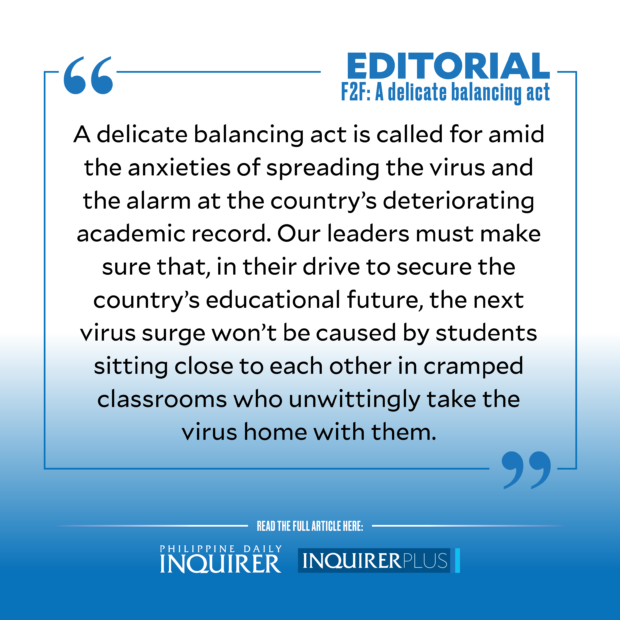F2F: A delicate balancing act
The coronavirus pandemic has brought countless challenges to the Philippines in the last two and a half years, including the irreplaceable loss of over 60,000 lives.
Since March 2020, the public health crisis has wreaked trillions of pesos worth of damage to the country’s economy that will unfold over the next generations.
In particular, the loss of economic productivity caused by restrictions on face-to-face learning for fear of spreading the virus further will be felt for decades to come.
According to the National Economic and Development Authority (Neda), the yearlong closure of schools during the first year of the pandemic cost the economy P230 billion in losses. And that’s just the initial blow. Over the expected labor force lifetime of an estimated 40 years among current students, the total losses could be as much as P10.7 trillion.
Moreover, the impact on productivity in each student’s lifetime is likely to be permanent, said Neda. Each day that Filipino students spend away from the classroom, each hour that they spend at home using minimally effective distance learning systems, results in incalculable damage to Philippine society in ways that cannot yet be fully tallied.
This is why it is so critical for the Marcos administration to resume face-to-face classes at the soonest practical time despite expressed apprehensions about how this could impact public health. Reopening the country’s schools for in-person learning is one of the best ways that our leaders can ensure that the Philippines returns to a sustainable, long-term path for growth.
Despite the urgency of the problem, the government’s response must be calibrated, well-thought-out, and sensitive to public needs. In fact, the solution calls for a fine balancing act that must carefully address the necessity of resuming onsite schooling, while also protecting students from the lingering threat of the COVID-19 virus.
For a start, policymakers should recognize the fact that the preparedness of the country’s educational system to resume face-to-face classes varies from school to school, depending on their resources, location, and leadership. Some educational institutions are blessed with resources and good leaders that allow them to resume traditional learning methods with few or no problems at all. Others are not so fortunate and may find themselves struggling to find ample classroom space that would allow returning students to adhere to the COVID-19 protocol of maintaining social distancing to avoid contamination.
This means giving educational institutions the flexibility, at their discretion, of either resuming face-to-face classes fully or using a hybrid system that would allow students to learn onsite on certain days and via electronic means on other days. This is what many companies have been doing to maintain productivity without unnecessarily risking their workers’ health.
At the same time, government leaders must recognize that the economic hardships wrought by the pandemic have forced many parents to conscript their children into the informal workforce to augment their family’s dwindling income. The prospect of going back to school then becomes less attractive.
As such, the government must redouble its efforts in incentivizing schooling for the children of the country’s poorest families. This means continuing its cash transfer program among families that commit to sending their children to school, with the children attending classes for a requisite number of days.
It is an expensive program, to be sure. But the alternative is more costly: a less productive member of the workforce whose lack of schooling translates to less marketable skills and less contribution to the economy.
Just as crucially, the government must pay heed to how educational institutions—especially those in marginalized communities—may find themselves struggling to handle a large student population who remain unvaccinated.
In this regard, the leaders of the education sector must work closely with health authorities to ensure that pupils who physically return to school, whether next month or later this year, have a modicum of protection against the virus. This means ramping up the vaccination campaign among the young and requiring students to be vaccinated. There are millions of vaccine doses set to expire next month as there have been few takers among the sectors already qualified for them. Authorities must redirect these vaccines toward students and mandate that only vaccinated ones can resume face-to-face classes.
Indeed, our leaders must remember that resuming onsite schooling is important. But it is just as important to make sure that the country does not slide back into the clutches of the pandemic in the process. Already, there are as many as 2,000 new COVID-19 cases a day, the highest since February.
A delicate balancing act is called for amid the anxieties of spreading the virus and the alarm at the country’s deteriorating academic record. Our leaders must make sure that, in their drive to secure the country’s educational future, the next virus surge won’t be caused by students sitting close to each other in cramped classrooms who unwittingly take the virus home with them.
For more news about the novel coronavirus click here.
What you need to know about Coronavirus.
For more information on COVID-19, call the DOH Hotline: (02) 86517800 local 1149/1150.
The Inquirer Foundation supports our healthcare frontliners and is still accepting cash donations to be deposited at Banco de Oro (BDO) current account #007960018860 or donate through PayMaya using this link.

















